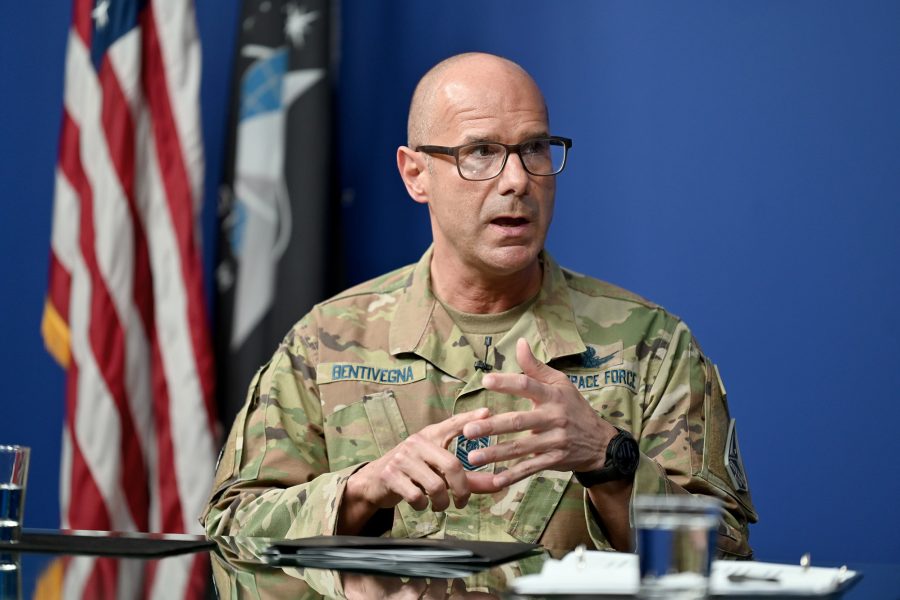The Space Force’s highest ranking enlisted leader offered more details on a new training program for noncommissioned officers, the latest move by the service to customize its training and development enterprise.
“We went through the first couple of iterations of what are referred to as the ‘noncommissioned officer academy,’” Chief Master Sergeant of the Space Force John F. Bentivegna said at the Senior Enlisted Leader International Summit on Aug 27. “We’ve done two or three iterations within the new fellowship model; it’s more an experience than traditional education. We just completed two of our senior noncommissioned officer fellowship experiences. We’re learning after each iteration.”
The service first introduced the fellowships this spring, marking a shift for its Forrest L. Vosler Non-Commissioned Officer Academy. Chief Master Sgt. April Brittain, Vosler Academy commandant, said at the time that “the curriculum that we were using was Airman-centric and just wasn’t catered enough to the service needs that we see in front of us.”
In particular, the fellowships focuses less on traditional academic approaches like lectures and more on “foundational Space Force competencies” and dynamic, engaged learning, according to officials.
Bentivegna said a timeline for finalizing this new noncommissioned training is pending. But it marks yet another step in the Space Force’s shift toward transforming its PME. Back in October 2022, the service announced it was partnering with Johns Hopkins University for officer intermediate- and senior-level developmental education instead of establishing a War College.
And in February, the service announced plans for a new Officer Training Course that will cover intelligence, cyber, and space operations—all three career fields of the Space Force. The inaugural course is set to kick off next week at Peterson Space Force Base, Colo. Over the course of 12 months, future officers will learn a comprehensive set of space skills. They will only focus in on one area after that.
“We’re looking at how we redefine professional military education to be unique and targeted towards the Guardians, so they thrive and succeed in the operational environment,” Bentivegna said.
Bentivegna stressed the importance of these efforts, particularly at a time when actively controlling the space domain, rather than merely defending it, is essential.
“It’s the space superiority—controlling the domain—that is extremely vital, and that’s what we’re focusing on as a service,” said Bentivegna. “It’s not just about protecting the capabilities that we have or providing them to our coalition allies and the joint force, to ensure that GPS is there, the SATCOM is there, but we have a responsibility. The domain has changed, how do we train our guardians, specifically our enlisted guardians, for the fight?”
Both China and Russia have made rapid advances in space recently, military and global leaders have warned in the last few months. Bentivegna highlighted in particular the scale of their forces:
- Russia, which first created a space force known as VKS in 1992, has seen it dissolve and reform several times over the decades. Reestablished in 2015 as part of its Aerospace Force, the VKS boasted around 165,000 personnel before the beginning of the Ukraine conflict.
- China established its Strategic Support Force (SSF) in 2015, which included a Space Systems Department responsible for space operations. The SSF, with an estimated 145,000 personnel in 2022, was dissolved and replaced by the Aerospace Force in April this year. It is now integrated into China’s military structure as one of four services.
The U.S. Space Force currently has about 14,000 Guardians. Bentivegna noted that the branch is on track to reach its recruiting goal of 15,000 Guardians by the end of the year. Of this total, nearly 5,000 will be enlisted members.
When Chief of Space Operations Gen. B. Chance Saltzman redefined the roles of officers, enlisted personnel, and civilians in the service earlier this year, he described the enlisted force as “technical specialists” and “weapon system experts,” while also noting their leadership contributions. Bentivegna echoed this view, underscoring the sought-after expertise of Guardians across combatant commands, joint staff, and other agencies.
“That’s a bit of a change in philosophy in space operations,” said Bentivegna. “What you can really do is tap into the maturity and talent of the enlisted Guardians and empower them to take on more in day-to-day execution. We’re training and developing them to embrace these responsibilities.”

